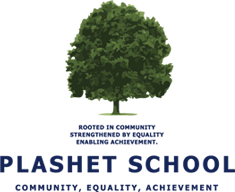History
Plashet Historians should possess powerful knowledge, demonstrate second order skills, critically assess and form judgments in order to use the past to make sense of our present.
All history is about us, and our understanding of the present is constantly shaped and revised by our past experiences. At Plashet we aim to look at “big picture” history that finds patterns and looks at how our individual histories are connected to our global world. We also examine how our local community has changed over time and how this has shaped our current understanding of our self. Our curriculum is one that builds on our prior understanding of topics linking old and new ideas. Our ultimate goal for all our students whether they take GCSE History or not is to be critical thinkers through assessing different perspectives and sources of information. We aim for all Plashet students to be well rounded and informed citizens.
In KS3, your daughter can expect to study a wide range of history.
We begin by examining how power and authority has changed from absolute monarchy to democracy. We assess the power relationships between monarchs and their people at different points in time, and look at the reasons behind the changes from previous periods.
Students will then look at empires, both Islamic Empires and the British Empire. Students will examine how empire and industrialization are interlinked, and how this culminated with the world wars in Europe. Plashet Historians are encouraged in year 8 to examine how different aspects of history are significant in the short term and long term, for example, we examine what WW1 did to change medical advances.
In year 9, History at Plashet looks at more complex societal histories such as the witch craze phenomenon in the 17th century, inequality in the USA during the 1920’s, civil rights in Britian and Berlin during the Cold War.
All units of study are put into context both locally and internationally through our “meanwhile elsewhere” or “meanwhile nearby” home learning tasks. This allows us to broaden the scope of Plashet Historians as well as frame current learning.
Exam Board and Syllabus - AQA History (8145)
Paper 1
Section A: Conflict & Tension 1918-1939: focuses on the aftermath of WW1 and the failure of the peace settlements in preventing another war.
Section B: Germany 1889-1945: focuses on the development of democracy in Germany, and the rapid shift towards dictatorship in the early 20th Century. Paper 1 awards 50% of the overall marks.
Paper 2:
Section A: Power and protest c1170 - present: a thematic study on popular protest through time.
Section B: Elizabethan England 1558-1603: A period study of England during the reign of Elizabeth I.
GCSE History students are expected to complete pre-reading tasks as home learning prior to studying a topic in class. This supports students in building a deep understanding of the content, developing their exam skills in lessons, and in preparing for A-Level where pre-reading is a requirement for success.
Enrichment opportunities
History masterclasses and clubs for KS3 and KS4.
Useful Links
For More Information on the GCSE specification & for examples of GCSE Past Papers, use these links:
AQA | GCSE | History | Specification at a glance
AQA | GCSE | History | Assessment resources
Useful revision websites include:
GCSE History - AQA - BBC Bitesize
